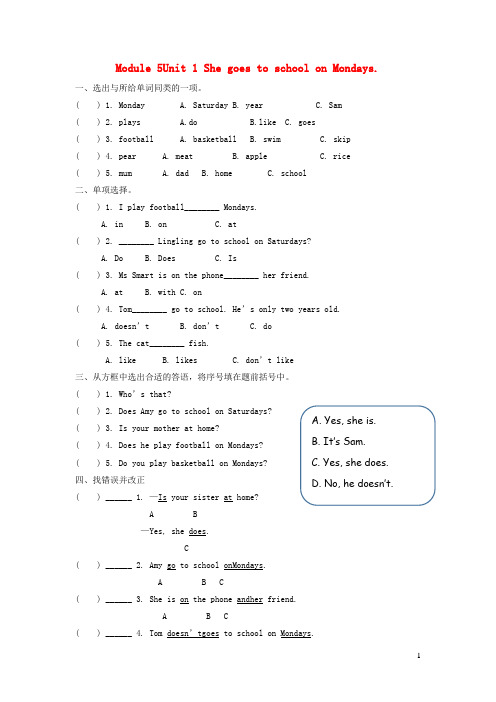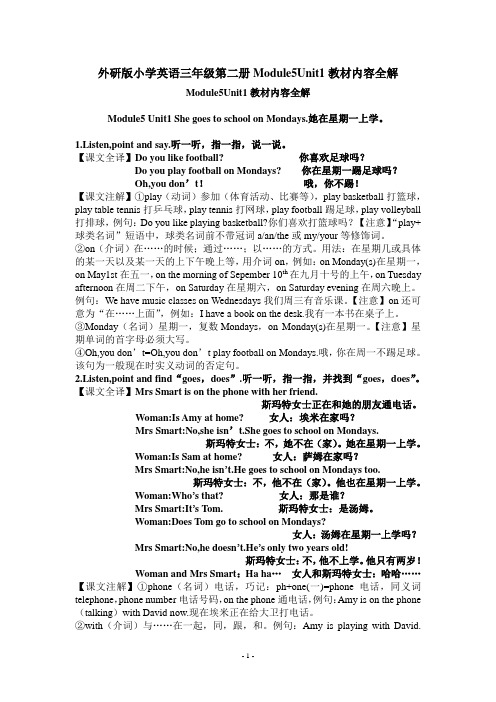Module 5 Activity Unit1 She goes to school on Mondays.模块
- 格式:doc
- 大小:201.00 KB
- 文档页数:6

Book 1 Modul e 5My School Day一 教学内容: Uni t1 I love h i s to ry . 二 课型:List en ing and speak ing 三 教学目标:1、掌握本节课的单词:half, past, o’clock , ar t , geography , hi s to ry , maths , PE, IT , l esson , l ike , d i f f i cu l t , love , sub j ec t , because , int e res t ing , love2、能听懂时间的表达法和分辨学校的科目。
3、能理解有关 a school day 的对话。
4、能介绍学校开设的科目及上课的时间。
四 教学重难点:能介绍学校开设的科目及上课的时间。
五 教学准备:本课指导学生通过听力获取信息,培养学生听力技能。
课堂上采用多媒体手段辅助教学,多媒体课件;挂钟一个;模拟钟一个(可任意调整时间)。
六 预习要求:根据音标自学本课新单词;七 教学过程:教师活动为学习“表达时间”做准备, 用游戏激发学 生兴趣,自然 导出话题。
复习小学学过 的 时 间表 达 法。
在引导学 生学习用 pas t , to 表达时间。
(2)Show a big c lock to the s tuden ts . Ask “What’s the time?” and ge t the Ss to l ea rn how to say ou t t he t ime .(2)Look a t the c lock .They may say : I t ’s one o ’c lock . I t ’s ha l f pas t one. I t ’s t en pas t two. I t ’s t en to th ree .引导学生谈论 实物及 ppt 上 的图片, 检查学生对词汇的掌握程度,训 练学生的表达out the new words . words : h i s to ry , maths , e tc . Step TwoPre-task( 5’) an ize the s t uden ts to l ea rn 2. Ta lk abou t t he l essons :the key s t ruc tures by ask ing : We have Chinese , Engl i sh ,maths …W e have Chinese a t e igh t o ’c lock .W e have Engl i s h a t …StepTask2: Do ac t iv i ty 21 Give s tuden t s some minu tes to 1 do ac t iv i ty2 by t hemse lves .Fi r s t l ea rn bythemse lves , then check the answer in the g roup . 2. Th ink a l l the sub jec t s in school tha t they s tudy .2. What sub ject i s Be t ty good a t? 2. What sub jec t i s Be t ty good a t?(1) Ssconversa t ion in ac t iv i ty 3 and check the t rue sen tences .(2)S tuden t read the passage wi th the v ideo . Then work in groups to(2)Organ ize the s tuden ts to readthe conversa t ion wi th the v ideo . Try to read the bes t in groups .(1). S tudent s come to theblackboard to show out some language poin t s , the other s tuden ts l i s t en to them care fu l ly and no te . 培养他们自主 学习的能力。

Module 5unit1 If she goes to a different school,I won't see my best friend.课前延伸1.大声朗读本单元的词汇及短语2.每日播报课内探究预习检测一.词汇乐园1.机会2.遗憾,羞耻___________3.拒绝,谢绝______4.警告,注意5.考试测验6.打,打败7.solo 8. final 9.rather 10.at the end of 11.such 12.be able to 二.语法闯关(用所给词的适当形式填空)1.If you ________(receive)a text message, answer it.2.If you _______(do)some work on your computer, save it.3.If a photo isn’t good, ______ (not show) it to your friends学习目标1.知识目标:(1)学会本单元的词汇:chance, shame, rather, pity, practice, exam, pity, refuse to do sth, be proud of , in front of, warn sb not to do sth.(2)掌握本单元的语法:if引导的条件状语从句2.技能目标:能就生活中遇到的“问题”与他人展开讨论和交流3.情感目标:通过本课学习使学生能够就自己生活中的一些问题与他人进行讨论,培养学生学习自信心及团结互助的精神。
听力训练1)Let's listen and choose what the problem is.What’s the problem?A. Tony doesn’t like playing the guitar.B. Tony spends too much time playing than his study.C. Tony likes to be alone. He feels pity2)listen again and answer the questions1.What does Tony’s mum suggest Tony’s dad?She suggests that he s____ Tony to a g_____ class2.Why does Tony’s dad think Tony will refuse to go to classes? Because he thinks that Tony likes to p___ a_____.3.What does Tony want to do?He wants to become the b_____对话处理Listen and answer the questions1.Who will choose the best player during the final practice?Our _____ _______ will choose the best player2. Why does Sally want Kylie to win?Because Sally will _____ her best ____.Check the true sentences:1.Both Sally and Kylie will play Irish music at the end of the Starsearchconcert.2.Sally’s parents will send her to another school.3.They’ll go to a different school together.4.Sally will refuse to play.5.If kylie becomes a star, her parents won’t send her away.A.找出并翻译下列短语1.在…面前___________2.在后台____________3.太多时间__________4.以…为自豪_________5.拒绝做某事________6.把某人送走________7.during our final practice____________B.合作探究1. Rather you than me!rather you/him/her than me用来表示很庆幸不会去做别人要做的事情,带有一点儿同情的意思,在句中可译为“好在没让我去!”或者“你行,我不行。

Module5Museums Unit1Don’t cross that rope!◇目标导航◇◇教学过程◇预习指导一、方法指导1.找出Activity 3对话中表示“禁止”的句型,归纳总结“禁止”的英语表达法。
2.画出对话中if引导的条件状语从句,体会其用法。
二、预习检测Ⅰ.根据句意及汉语提示完成单词或短语,每空一词1.Look at the sign.It says“No swimming”(禁止游泳).2.Most people are against(反对)building a paper factory near here.They are worried that the river will get polluted.3.There are some rules(规则)in Dayton Art Museum.For example,no food or drink is allowed inside.4.When we are in trouble(遇到麻烦),we should face the challenges,instead of worrying about our problems.5.It’s no good hoping(希望)for other’s help.6.No wonder(难怪)you were late—you ate your breakfast so slowly.7.She said his friends could sleep over in the big room downstairs(楼下的).Ⅱ.汉译英1.请勿大声喧哗!它违反规定。
No shouting,please!It’s against the rules.2.大明又遇上麻烦了。
Daming is in trouble again.3.不要越过那条绳子!Don’t cross that rope!4.难怪这个地方空着!No wonder the place is empty!5.我不得不找到它,否则妈妈会惩罚我。

Module 5Unit 1 She goes to school on Mondays.一、选出与所给单词同类的一项。
( ) 1. Monday A. Saturday B. year C. Sam( ) 2. plays A.do B.like C. goes( ) 3. football A. basketball B. swimC. skip ( ) 4. pear A. meat B. appleC. rice ( ) 5. mumA. dadB. homeC. school二、单项选择。
( ) 1. I play football________ Mondays.A. inB. onC. at( ) 2. ________ Lingling go to school on Saturdays?A. DoB. DoesC. Is( ) 3. Ms Smart is on the phone________ her friend.A. atB. withC. on( ) 4. Tom________ go to school. He’s only two years old.A. doesn’tB. don’tC. do( ) 5. The cat________ fish.A. likeB. likesC. don’t like三、从方框中选出合适的答语,将序号填在题前括号中。
( ) 1. Who’s that?( ) 2. Does Amy go to school on Saturdays?( ) 3. Is your mother at home?( ) 4. Does he play football on Mondays?( ) 5. Do you play basketball on Mondays?四、找错误并改正( ) ______ 1. —Is your sister at home?A B—Yes, she does.C ( ) ______ 2. Amy go to school onMondays.A B C ( ) ______ 3. She is on the phone andher friend.A B C( ) ______ 4. Tom doesn’tgoes to school on Mondays.A. Yes, she is.B. It’s Sam.C. Yes, she does.D. No, he doesn’t.A B C( ) ______ 5. Tom is only two yearold.A B C五、译一译。

外研版三年级下册英语Module 5《Unit 1 She goes to school on Mondays.》教案一、教材分析:本课是外研版三年级下册英语Module 5《Unit 1 She goes to school on Mondays.》的教材,主要围绕日常活动展开,学生将学习描述第三人称日常活动的句型"He/She goes to school on Mondays.",并学习相关的词汇和短语。
通过听、说、认读,学生能够理解并运用这些句型和词汇,从而能够描述他人的日常活动。
二、教学目标:1. 能够听、说、认读Monday, play, friend, go to school, on the phone, at home 等单词和短语。
2. 听懂、理解课文对话大意,能够运用正确的语音语调朗读并表演对话。
三、3. 理解并使用句型"He/She goes to school on Mondays."谈论第三人的日常活动。
四、教学重难点教学重点:1. 理解、识记本课词汇。
2. 听说并运用句型"He/She goes to school on Mondays."教学难点:理解并掌握动词第三人称单数的变化: gogoes; playplays四、学情分析:学生已经学过一些基础的英语词汇和句型,但对于动词第三人称单数的变化可能还不太熟悉。
他们具有一定的听说能力,但需要更多的练习和巩固。
因此,本节课的教学重点是帮助学生掌握新的词汇和句型,并加强对动词第三人称单数变化的理解和运用。
五、教学过程:Step 1: Warmup1. 教师与学生互动,用英语进行日常活动的问答:Teacher: "What day is it today?"Student: "Today is Monday."Teacher: "What do you do on Mondays?"Student: "I go to school on Mondays."Step 2: Presentation1. 教师展示图片或实物,教授词汇的发音和意思:Teacher: "This is Monday. Can you say 'Monday'?"Students: "Monday."Teacher: "Good! What day es after Sunday?"Students: "Monday."Teacher: "Correct! Now let's learn another word. This is 'play'. Can you say 'play'?"Students: "Play."Teacher: "Excellent! 'Play' means to have fun or engage in a game or activity. Can you give me an example sentence with 'play'?"Students: "I like to play soccer."Step 3: Practice1. 教师播放课文对话录音,让学生跟读。

外研版小学英语三年级第二册Module5Unit1教材内容全解Module5Unit1教材内容全解Module5 Unit1 She goes to school on Mondays.她在星期一上学。
1.Listen,point and say.听一听,指一指,说一说。
【课文全译】Do you like football? 你喜欢足球吗?Do you play football on Mondays? 你在星期一踢足球吗?Oh,you don’t!哦,你不踢!【课文注解】①play(动词)参加(体育活动、比赛等),play basketball打篮球,play table tennis打乒乓球,play tennis打网球,play football踢足球,play volleyball 打排球,例句:Do you like playing basketball?你们喜欢打篮球吗?【注意】“play+球类名词”短语中,球类名词前不带冠词a/an/the或my/your等修饰词。
②on(介词)在……的时候;通过……;以……的方式。
用法:在星期几或具体的某一天以及某一天的上下午晚上等,用介词on,例如:on Monday(s)在星期一,on May1st在五一,on the morning of Sepember 10th在九月十号的上午,on Tuesday afternoon在周二下午,on Saturday在星期六,on Saturday evening在周六晚上。
例句:We have music classes on Wednesdays我们周三有音乐课。
【注意】on还可意为“在……上面”,例如:I have a book on the desk.我有一本书在桌子上。
③Monday(名词)星期一,复数Mondays,on Monday(s)在星期一。
【注意】星期单词的首字母必须大写。
④Oh,you don’t=Oh,you don’t play football on Mondays.哦,你在周一不踢足球。
1 / 4Module5 Unit1 She goes to school on Mondays.(第一课时)I.Teaching aims 1.Knowledge aim:⑴理解、记忆go to school, play,on, Monday ⑵会初步运用句型:He/She ... on Mondays.⑶进一步让学生感知实义动词在第三人称单数的时候如何变化和发音。
2.Ability aim:⑴全体学生会听,说He/She ...on Mondays.⑵部分同学能运用所学句型,简单谈论自己及同学的日常活动。
3.Emotional aim:积极参与各种课堂学习活动,乐于了解国外人文风俗。
II.Key and difficult points⑴理解识记本课单词、短语,会听说并能运用句型:He/She ... on Mondays.⑵掌握简单的动词第三人称单数的变化:go—goes, play —plays.III.Teaching aidsPPT,word's cards,pictures,stickers. IV.Teaching procedures Step1warming up 1.sing a song“Hello Song”2.warmer2 / 4T: Hello,boys and girls.I'm Ms Shi.Begin to our class,let do actions. Follow follow me![老师做一些孩子熟悉的单词,配上象声词,让孩子充分活动起来。
例如:sing,sing. I likesinging. O LA LA .O LA LA一共举出5组] T:Great! Can you do by yourselves quickly? Step2presentation T: Hello, how are you? Do you like table tennis?Thank you. I like table tennis, too. So I play table tennis on Mondays.[老师通过简单的师生对话,将今天要讲的新内容引出] T:Monday is the first day in a week. And Mondays is? Yes, so many Mondays get together. T:Can you guess what am I doing? Clever. play football. [单词练习,开火车] T:Listen! What's the sound? Yes, good job! play basketball.[单词练习,touch the cards, read one by one] T:Listen again, guess! What's the sound? Well done. play table tennis.[单词练习,touch the cards, read one by one, line by line]3 / 4T: What's this?Yes, great! school. We go to school every day. But Amy goes to school on Mondays.[单词练习,go to school,并且造句子I go to school. You go to school. We go to school.转折but,出示Amy的照片,引出第三人称,并注意单词变化]T: I play football on Monday(在黑板上)[人称替换,同时play加S.人称换成He.这时候,和孩子们一起改剩下两句,并注意发音“s”。
Unit1She goes to school on Mondays.教学目标知识目标:1.理解并识记词汇:goes,go to school,on,Monday,play,phone,on the phone,with,friend,at home,who,only,year。
2.能初步运用句型:He/She goes to school on Mondays.Does he/she go to school on Mondays?3.让学生初步感知第三人称单数。
能力目标:能运用所学句型,简单谈论家庭成员的日常活动。
情感目标:积极参与各种课堂学习活动,乐于了解国外人文风俗。
教学重点理解并识记本课单词、短语,能运用本课句型。
教学难点掌握动词第三人称单数形式的变化:go—goes,play—plays等。
教学用具PPT,pictures,CD-ROM and stickers.教学过程Step1Warm-up1.Greeting.T:Class begins.Stand up!Ss:Good morning,Ms Gao.T:Good morning,boys and girls.2.Chant.T:Now let’s say a chant together,OK?Ss:OK!(PPT展示chant 内容)I like coffee.I like tea.I like cats and they like me.I like coffee.I like tea.I don’t like lions and they don’t like me.Step2Presentation1.展示足球以及踢足球图片。
T:He likes football.He is playing football.(加上动作帮助学生理解)T:Do you play football?引出并教学“play”。
(分组读,高低音读,开火车读,抽读)2.T:Do you play football on Mondays?引出并教学“on Mondays”。